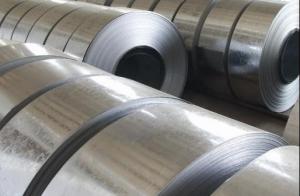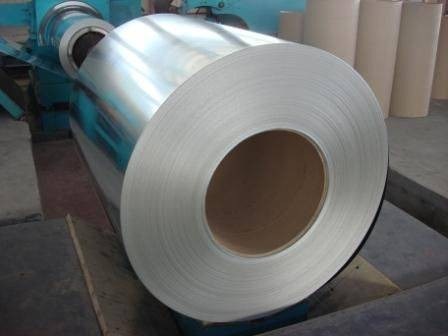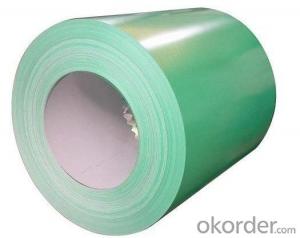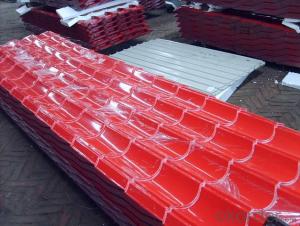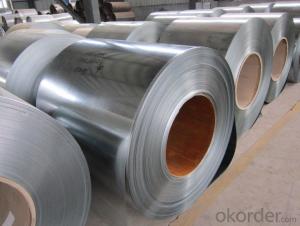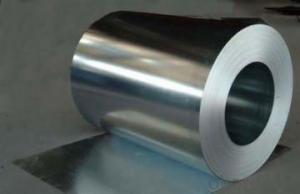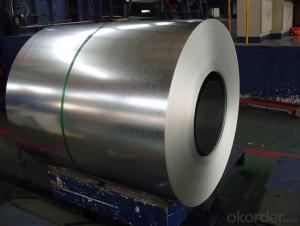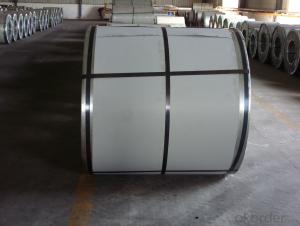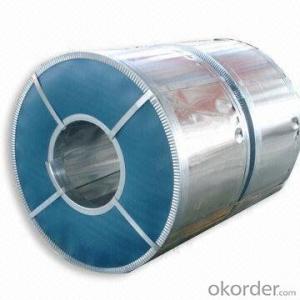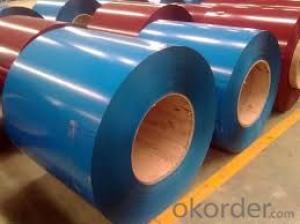American Standard Hot Dipped Galvanized Steel Coil
- Loading Port:
- China Main Port
- Payment Terms:
- TT OR LC
- Min Order Qty:
- -
- Supply Capability:
- -
OKorder Service Pledge
Quality Product, Order Online Tracking, Timely Delivery
OKorder Financial Service
Credit Rating, Credit Services, Credit Purchasing
You Might Also Like
ASTM A653 CS-B, Z180, REGULAR SPANGLE, CHROMATED & UNOILED
SIZE (MM) | MOQ (MTS) | |
0.50*1250*C | 100 | |
1.00*1250*C | 100 | |
2.00*1250*C | 100 |
COIL ID: 508MM / 610MM
COIL WEIGHT: 8MTS MAX
PACKING: EXPORT SEAWORTHY METAL PACKING
LOADING PORT: SHANGHAI, CHINA
PAYMENT: 100% LC AT SIGHT
SHIPMENT: 60 DAYS AFTER LC ISSUING DATE
SGS before shipment by buyer's account
- Q: Is the product of mild steel environmentally friendly? does it produce any emissions?The same question for leather aswell.
- Steel just rusts, it doesn't produce any emissions just sitting there. They even make architectural steel called Corten to rust to a nice patina. If you consider how the steel was made in the first place, a great big NO! Steel making requires massive amounts of electricity plus it gives off some nasty fumes in the liquid state. Leather itself doesn't emit much of anything, but the dyes might. Again though, if you look at how it's made, tanning leather is right up there with steel mills and paper mills for pollution, some of the worst.
- Q: What are the different coil slitting methods used for steel coils?
- There are three main coil slitting methods used for steel coils: rotary shear slitting, loop slitting, and oscillating slitting. Rotary shear slitting involves using rotating knives to cut the steel coil into narrower strips. Loop slitting is a process where the coil is looped through a series of rolls, and the desired width is achieved by adjusting the tension in the loop. Oscillating slitting is another method where the steel coil is passed through a set of oscillating blades, resulting in precise and high-speed slitting. These methods offer various advantages and are chosen based on the specific requirements of the steel coil slitting process.
- Q: I am making a sword of 1060 carbon steel and would like to know how to heat treat it once it's ready, could anyone help please?
- Heat treating easy, HA! It is the most critical part of bladesmithing. Done wrong and all those hours of work go up in smoke (or a snap of the steel). You'll need a bucket of oil, preferably one that is deep enough to go in point first. If not you'll have to go in edge first, not recommended on a double edged blade, ok for single edge. You'll need to build a charcoal fire long enough for the blade. You will need to blow air under the fire to get it hot enough, the challenge is getting the heat even. You get the fire going and established, put the blade in turning it back and forth (if you keep turning it in the same direction when it heats up you could work a twist in it). When it starts turning red pull it out and touch it with a magnet, if the magnet sticks put it back. Keep heating and repeating until the magnet no longer sticks. Heat a little more, then quench rapidly point first. Don't let the blade lean to one side as warpage will occur. When it cools enough to touch, check with a file. If the doesn't file cut then you've properly hardened the steel and it's ready for temper. Now comes the really hard part. Grind the scale off carefully,preferably with a side grinder with a flap wheel. I've had hard wheel break freshly hardened blades. After cleaning you'll need to put it in an oven (preferred) or use a torch and carefully heat the blade. Watch the temper colors (oven temp 500-550F) or with the torch as the steel turns colors blue to purple for a double edged weapon. Any warpage that occurs needs to be worked out at temping temp.
- Q: Are you people aware of commercial steel warehouses, If yes then can you please explain their advantages and benefits?
- Compared to what?
- Q: How are steel coils used in the production of packaging materials?
- Steel coils are used in the production of packaging materials as they are processed and shaped into various forms, such as sheets or strips, which can be used to create durable and sturdy packaging products. These coils are often used to make packaging materials like cans, drums, and containers, providing strength, structural stability, and protection to the packaged goods during storage and transportation.
- Q: Steel is a mixture of Iron Carbon . So , is steel a metal or non - metal ?
- steel is an alloy - mix of two meatls alloy is a mixture and metal is an element so no comparision
- Q: Ok.. I was wondering if it's possible for me to recycle baked bean cans (steel)? And if so in Western Australia (that's where I live)?I love baked beans... and I also like skateboarding, so I thought if I kept my baked bean cans, that I could get them recycled somewhere and turn it into something I could skate on (rail, etc.). I'm just curious to know if all this is possible...Cheers. :)
- Steel is one of the most recycled materials on the planet... Unless you know a recycler/steel refiner/manufacturer however, it would be mighty difficult for you to have someone melt down all your baked bean (a somewhat American dish, I'd say) cans. Plus, think how many baked beans you'd have to eat to be able to build anything of substance. Don't know where you would take it in Australia - I'm in the US where a lot of municipalities collect mixed recyclables.
- Q: I need to construct a table with three columns, which states the name of the steel, its compositions (e.g. Fe and C), and its special properties for a variety of different steel products.Help me please, a site with info would be great, explanations would be even better.
- Steel is an alloy consisting mostly of iron, with a carbon content between 0.2% and 2.1% by weight, depending on the grade. Carbon is the most common alloying material for iron, but various other alloying elements are used, such as manganese, chromium, vanadium, and tungsten.[1] Carbon and other elements act as a hardening agent, preventing dislocations in the iron atom crystal lattice from sliding past one another. Varying the amount of alloying elements and form of their presence in the steel (solute elements, precipitated phase) controls qualities such as the hardness, ductility, and tensile strength of the resulting steel. Steel with increased carbon content can be made harder and stronger than iron, but is also less ductile. H.
- Q: What are the different types of steel coil edge conditions?
- There are several different types of steel coil edge conditions, each designed to meet specific requirements and applications. The most common types include: 1. Mill Edge: Mill edge is the default edge condition for hot-rolled steel coils, where the edges are left as they come out of the rolling process. This edge condition is characterized by a slightly rough and uneven surface. 2. Slit Edge: Slit edge is created by cutting the coil along its width to achieve narrower strips. This edge condition is typically smoother and more uniform than mill edge, making it suitable for applications where a clean and precise edge is required. 3. Trimmed Edge: Trimmed edge is achieved by removing irregularities and imperfections from the edges of the coil. This process results in a straight and smooth edge, making it suitable for applications where a precise and uniform surface is necessary. 4. Deburred Edge: Deburred edge is created by removing burrs or sharp edges from the coil. This edge condition is commonly used in applications where safety is a concern, as it eliminates any potential hazards associated with sharp edges. 5. Round Edge: Round edge is achieved by rounding the corners of the coil. This edge condition is often employed in applications where the material needs to be easily handled or when there is a need to prevent damage to other materials or surfaces. 6. Slit and Deburred Edge: Slit and deburred edge combines the benefits of both slit edge and deburred edge conditions. It involves cutting the coil to achieve narrower strips and then removing any burrs or sharp edges, resulting in a clean and safe edge. Each of these edge conditions serves a specific purpose and is chosen based on the requirements of the application. By understanding the different types of steel coil edge conditions, one can select the most suitable option to ensure optimal performance and safety.
- Q: What are the common applications of cold-rolled stainless steel coils?
- Cold-rolled stainless steel coils have various common applications in industries such as automotive, construction, and manufacturing. They are commonly used in the production of appliances, kitchen equipment, roofing, and cladding materials due to their corrosion resistance, durability, and aesthetic appeal. Additionally, cold-rolled stainless steel coils are utilized in the fabrication of pipes, tubes, and structural components, as well as in the production of surgical instruments and medical equipment, owing to their sanitary and hygienic properties.
Send your message to us
American Standard Hot Dipped Galvanized Steel Coil
- Loading Port:
- China Main Port
- Payment Terms:
- TT OR LC
- Min Order Qty:
- -
- Supply Capability:
- -
OKorder Service Pledge
Quality Product, Order Online Tracking, Timely Delivery
OKorder Financial Service
Credit Rating, Credit Services, Credit Purchasing
Similar products
Hot products
Hot Searches
Related keywords
